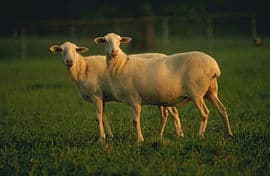Type the name of the breed you're looking for below
[wpdreams_ajaxsearchlite] Don't see the breed your're looking for? Click here and let us know!
St. Croix sheep
| Place of Origin | U.S. Virgin Islands |
| Origin | The St Croix (Saint 'Croy') is a breed of domestic sheep native to the U.S. Virgin Islands and named for the island of Saint Croix. They are often also called Virgin Island White because those that were imported into North America were selected for white colouration. On the Island of St. Croix, they come in shades of brown, white and black. The breed is believed to be descended from African sheep that were brought to the Caribbean on slave ships, and is a breed of hair sheep which does not grow wool. The St Croix is a hardy tropical breed known for its parasite resistance, and is raised primarily for meat production. Breeders have crossbred the St Croix with other breeds to impart these important traits into their bloodlines. The St Croix breed is the foundation breed for Katahdin and Royal White breeds. |
| Purpose | Meat |
| Characteristics | Most St. Croix are completely white with others being solid tan, brown, black or white with brown or black spots. Ewes and rams are polled (no horns), and rams have a large throat ruff. Mature ewes weigh 68 kg (150 lbs) and rams weigh 90 kg (200 lbs). Birth weights average 2.7 kg (6 lbs) to 3.1 kg (7 lbs). Tail should not need docking. Adaptability: St. Croix sheep can live in a wide variety of climates. They are well adapted to the hot humid climate of the tropics and can survive in cold temperatures. Their hair coat lets them tolerate the heat, and they grow a thick wool coat in cold winter temperatures. Their coat sheds water. These sheep are known as 'Parasitic Pasture Vacuums' for their ability to clear a pasture of parasites reducing the need to worm sheep. St. Croix also show resistance to hoof rot. Due to their hair shedding ability, sheep should be fly strike resistant. |
| Other Considerations | Carcass and Growth: Lambs finish with a minimal amount of fat and have a small bone to fat ratio. Meat is lean and without the tallow taste, as well as naturally low in cholesterol. Flavor and aroma is described as mild. Meat is judged as having good flavor, juiciness, and tenderness. Lambs have a slightly slower growing rate than most sheep breeds. Temperament: St. Croix are easy to handle livestock. Sheep should be active without showing signs of being wild or flighty. Charging and head butting is a less common behavior in rams. Sheep tend to be comfortable around people. St. Croix have a good herding instinct and are often used to train herding dogs. Vegetation management: St. Croix sheep are both grazers and browsers. They are not selective eaters. Sheep have been used for weed control due to their preference for weeds. St. Croix sheep are easily managed. |



